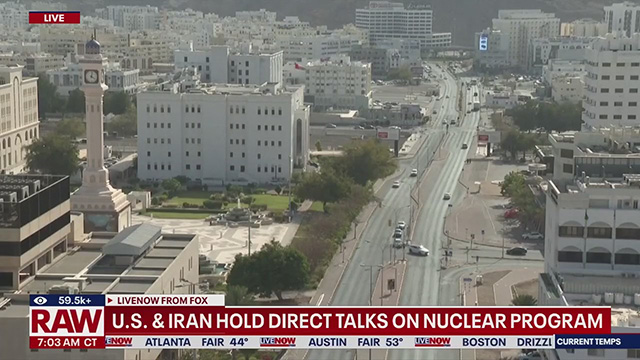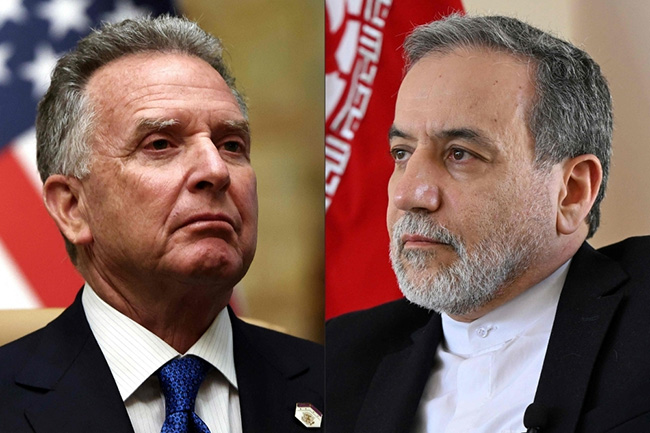
The US President Donald Trump sought direct talks and claimed that Iranians conveyed through back channel that they had no objection to it. Furthermore, Trump disclosed that indirect talks already started. While maintaining publicly that the talks will be ‘indirect’, Iranians didn’t call out Trump, notes M.K. Bhadrakumar, Indian Ambassador and prominent international observer.
Accordingly, Trump nominated his trusted aide and longstanding friend Steve Witkoff to represent him at the talks. Tehran reciprocated with Abbas Araqchi, a veteran nuclear negotiator and brilliant diplomat, and currently the foreign minister.
 US envoy Steve Witkoff (L) and Iran’s Foreign Minister Abbas Araghchi.
US envoy Steve Witkoff (L) and Iran’s Foreign Minister Abbas Araghchi.
Photo: AFP
Trump noted with satisfaction that Tehran has fielded a negotiator at the highest possible level. Interestingly, Trump made the announcement on the talks from the Oval Office in the presence of Israeli prime minister Benjamin Netanyahu.
Such hyper activism on the optics may create a surreal impression. After all, there is also a military build-up going on in the US base in Diego Garcia, including B-52 heavy bombers with a range of 10000 kms. But the Russian assessment is that the US’ mobilisation of military assets falls way short of the level of force strength required to start a war with Iran.
The presence of Araqchi and Witkoff at the talks in Muscat underscores that both sides are approaching the talks in all seriousness conscious of the real risk of a dangerous escalation of the present precarious situation around the Iran nuclear issue if concrete progress is not achieved in the negotiations by mid-2025.
With the foreplay over and US-Iranian talks commencing in Muscat on Saturday, a constructive engagement has begun in right earnestness. The sure sign of it is that Iran’s currency rose nearly 6 percent on Sunday. The Tehran bazaar, the weathervane of Shia politics, has spoken.
Most important, the two key negotiators in Muscat Steve Witkoff and Abbas Araqchi have decided to return to the talks on April 19 in exactly a week’s time after reporting back to their principals in Washington and Tehran respectively and seeking fresh guidelines going forward.
The White House said the talks were positive and constructive and appreciated that “direct communication was a step forward in achieving a mutually beneficial outcome.” Witkoff described the talks as “very positive and constructive.”
Iran’s foreign ministry said the talks were held in “a constructive atmosphere based on mutual respect. Araqchi also described the negotiations as “promising and constructive.” Significantly, Araqchi told the Iranian national television that the talks brought the two sides closer to establishing “the basis of negotiations” for future discussions.
Signalling to Witkoff and addressing the domestic audience, Araqchi gave an insightful perspective. He said the discussions aimed to create a structured agenda for the negotiations based on a timeline. The following remarks by Araqchi must be noted carefully:
“We agreed to hold a second round next Saturday, and in the next session, we will delve into the overall framework that a deal can take to see how far this process can advance.”
It is important to set a basis for the talks; “If we can finalise the basis in the next meeting… we can begin real discussions based on that basis.”
The talks were conducted in a “calm and very respectful atmosphere. No inappropriate language was used. Both sides demonstrated their determination to advance the talks until an agreement is reached that is desirable for both parties and is based on an equal footing.”
Neither Iran nor the US wants to “negotiate for the sake of negotiating” and does not favour protracted “attritional talks.” Both sides voiced their keenness to achieve an agreement “at the shortest time. This, however, will not be easy and requires full determination of the two sides.”
The crux of the matter is that the initial round of talks in Muscat represents a turning point in the challenging dynamics between Tehran and Washington. According to the Tehran grapevine, the talks focussed on two intertwined contentious issues — sanctions relief and the nuclear issue — as in the past negotiations.
The clock starts ticking for the E3 (France, Germany, and Britain) to move to restore the UN Security Council sanctions on Iran by invoking the JCPOA’s veto-proof ‘snapback’ mechanism for which the cutoff date is the month of October.
Tehran has warned that if the UN sanctions are restored, it may withdraw from the NPT in response and if that happens, it is no longer obligated to retain IAEA safeguards. But there is a gestation period of 3 months before Iran’s exit from NPT gets formalised.
According to the 1992 nuclear cooperation agreement between Moscow and Tehran, “nuclear material, equipment, special non-nuclear-material, and related technology” as well as nuclear materials produced by the result of transferred technology “shall be under the International Atomic Energy Agency safeguards” during their “entire period” of stay in Iran.
The agreement further stipulates that these materials “shall be used only for declared purposes that are not connected with activities of manufacturing nuclear explosive devices” and “shall not be used to carry out activities in the field of nuclear fuel cycle” that are not under IAEA safeguards.
Suffice to say, at the very least, Iran’s nuclear cooperation agreement with Russia may obligate Tehran to retain some IAEA presence. Russia’s economic interests in nuclear cooperation with Iran will also play a part. Besides, the recent Russian-Iranian treaty on strategic cooperation explicitly affirms Tehran’s commitment to nuclear non-proliferation. Russia also tends to prioritise a constructive engagement of the US in its foreign policies and its moderating influence on Iran lest it goes the North Korean way will be a significant factor in the US-Iranian negotiations. The situation around Iran has already figured more than once in the recent US-Russia exchanges since February including at the highest level between Trump and Russian President Vladimir Putin.
During last week, against the backdrop of the talks in Muscat, President Masoud Pezeshkian made certain significant remarks. It is entirely conceivable that he was speaking for Supreme Leader Ayatollah Ali Khamenei.
First, Pezeshkian said Khamenei is “not opposed to US entities investing capital” in the Iranian economy. Succinctly put, this is a radical departure from Iran’s traditional stance.
Second, Pezeshkian said, “We are open to dialogue, but with dignity and pride, we will not compromise on our achievements and we will not make deals (on them).” In effect, Pezeshkian has notified that any suggestions that the only acceptable deal with Iran must include complete dismantlement of the country’s nuclear program will be a non-starter.
Third, Pezeshkian not only reiterated Iran’s rejection of nuclear weapons but stated its willingness to be subject to robust safeguards. As he put it, “We are not looking for an atomic bomb. Who is setting policy above the Leader of the Islamic Revolution who has officially announced that we are not looking for a nuclear bomb? Check it a thousand times. You can verify a thousand times that we don’t have atomic bombs, but we need nuclear science and nuclear energy.”
Fourth, Pezeshkian also had a message of sorts for Israel. He said, “We are not looking for war, but we will stand strong against any aggression with the knowledge and power that our scientists have created. The more they harm us, the more powerful we will become, and the stronger we will stand against any threat they pose to us.”
Taken together, these remarks by Pezeshkian would give a fair idea of what the contours of a possible settlement of the nuclear issue could be as the talks proceed.
Most importantly, Iran seeks an economic partnership with the US and implicit in its is the unspoken readiness for political and diplomatic ties. Iran’s approach bears an uncanny resemblance to what Russia has adopted in its nascent dialogue with the Trump administration. Trump’s choice of Witkoff as the negotiator for Iran can be seen as a signal that the US is open to explore opportunities of economic cooperation with Iran as an underpinning to the normalisation process. (By the way, Washington Post has reported that Witkoff is willing to travel to Tehran, if invited.) Certainly, Tehran pins hopes on Witkoff bringing new thinking into the paradigm. Do not be surprised if he travels to Tehran in a near future.
That said, the Trump administration must appreciate that Iran lives in a tough security environment and is attempting to use its nuclear threshold status as a deterrent. Therefore, what is possible is a combination of limits and monitoring that can adequately reduce proliferation risks.
When I visited Tehran last June to observe the presidential election, a topic that came up in almost all conversations and TV interviews was: What to expect from a Trump administration? What I could sense was that contrary to what Israeli media management strives to project to muddy waters, Tehran has no revenge mentality and instead senses that Trump’s priorities in a second term are not about projection of power but the regeneration of America. As a civilisational state that was never colonised through millennia, Iranian culture is highly pragmatic but it will never surrender its legitimate interests or compromise under pressure. In this respect, it is a unique country in the region.
Iran’s relevance to the regeneration of the American economy (MAGA) is self-evident. Apart from vast mineral resources, Iran’s human resources can give a solid underpinning to economic and technological partnership with American business and industry. An enduring nuclear deal with Iran is best achieved through an overarching relationship to reengage with Iran as a partner after over four decades.
Reaching a mutually agreeable framework for dialogue could pave the way for reducing tensions and returning to a diplomatic path. It is doable today from all indications.
This is not to overlook that the path ahead remains challenging and fraught with obstacles. Sensitive issues need to be sorted out such as the the timing of sanctions relief, the scope of nuclear commitments, and verification mechanisms. Nonetheless, the bottom line is that the return to diplomacy after such high spiralling of tensions in the recent months provides an opportunity to rebuild relative trust and recalibrate US-Iran relations — at least on technical and substantive levels.
read more in our Telegram-channel https://t.me/The_International_Affairs

 11:38 14.04.2025 •
11:38 14.04.2025 •






















